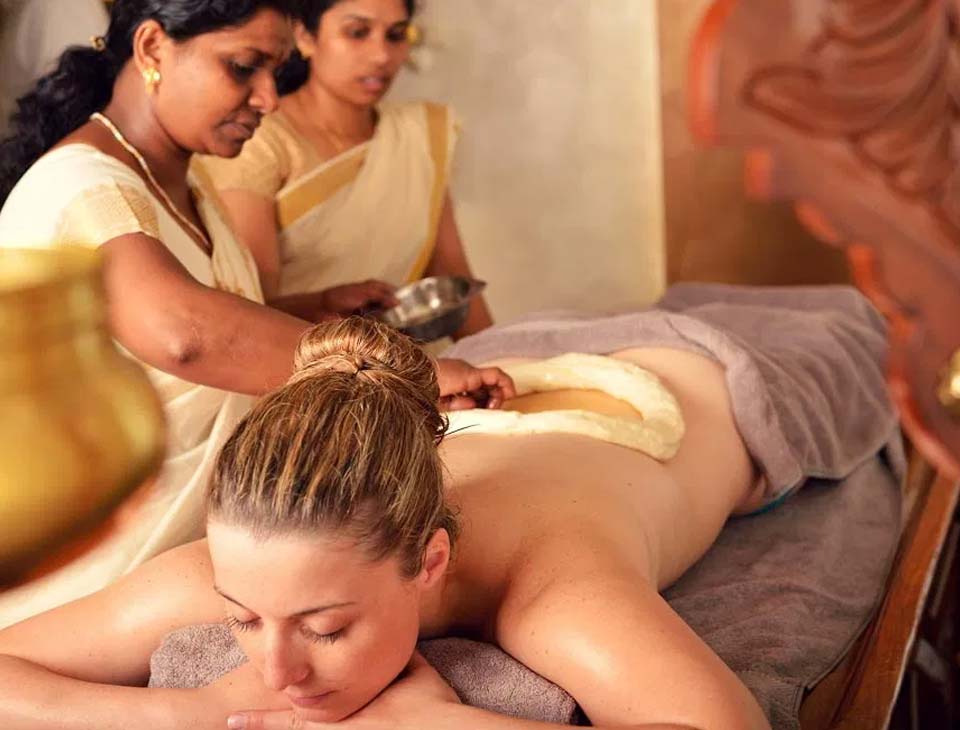What is Ayurveda?

What is Ayurveda?
AYURVEDA - WISDOM FROM A FULL LIFE
Ayurveda has been the traditional Indian medical system for over 5000 years and to this day represents the primary care for over 1.3 billion people on the Indian subcontinent. It considers the human being as a whole, his physical and mental constitution and his social environment. Ayurveda is recognized by the WHO as a natural healing method. A stay in the Ayurveda Center Germany in Bad/Bocklet or in the centers of the Madukkakuzhy family in Kerala, India helps to calm down physically and mentally, to readjust and to achieve sustainable regeneration and healing.
Ayurveda, yoga and meditation are siblings from the root of the Vedic sciences that have been used for millennia to heal the body, enhance mindfulness and clear consciousness. While Ayurveda is more concerned with the physical dimension of the human being, yoga strengthens both the body and the mind, and meditation clears and structures the consciousness. In practice they complement each other. In yoga, the focus is on the individual’s own activity, which is strengthened by physical exercises (asanas) and breathing exercises (pranayama). The practitioner develops a power to guide his consciousness. In connection with meditation, he learns to calm his shimmering mind and let go of thoughts, so that he can also achieve inner order and clarity within the different life situations. There are myriad forms of meditation, from dynamic or dance meditation to sitting still in front of a white wall. Everyone can find the form that suits them. Both Ayurveda and Yoga see our consciousness as the primary force of life, which controls everything and decisively determines how we shape our lives. Our daily yoga classes are conducted by qualified yoga teachers.
You are healthy when you live your life free of pain, with flexible joints and a happy heart.
Life in balance:
Ayurveda tries to preserve or restore the balance of body, mind and soul and to give it stability.
The 3 dosha principle:
In Ayurveda, there are three main constitutional types (Doshas):
Vatha
Represents air, movement, fast, cool, intelligent, nervous. Vatha types should always eat warm.
Pittha
Stands for fire, energy, drive, tends to inflammation. Pittha types shouldn’t eat spicy foods.
Kapha
Stands for earth and water, the structural principle is loyal, reliable, tends to be overweight. Sweets would be taboo for this type, slightly bitter or spicy is good, carbohydrates should be largely avoided.
Most people are hybrids of two main types, yet everyone has a mix of all three types. Every dosha is active in every cell of the body.
Vatha, Pitta and Kapha influence all physical and mental-spiritual processes. If they are in balance, then the person is healthy. If they get out of balance, the processes in the human organism are disrupted or misdirected.
Basically, it depends on dosha-appropriate nutrition and behavior. You can see a brief summary of the main measures here…
Body and soul
Ayurveda is actually not a purely medical system, but a philosophy about life in all its aspects. The attention is not fixed on the respective illness, but has the whole in view, the physical constitution, the behavior pattern, the attitude to life. Diet, medication and supportive treatments are tailored to this.
Factors inherited from father and mother also play a role, as does spiritual worldview, social attitude, and food choices; regional and seasonal factors also have an influence. Research is carried out into the causes of the disease, with a view to time, sensory perception, language and psychosomatic reactions.
Conventional medicine and Ayurveda agree that health is not only about being free from illnesses, but also defines the state of physical, mental and social well-being.
Principles of Indian medicine
- Psychosomatic concept of drug and disease.
- Medicine comes from nature and is purely herbal.
- It has existed for thousands of years and originated in India.
- Diagnosis and therapy are carried out according to the individual’s body and the state of the disease
- Stimulates and strengthens the body’s defense mechanisms.
- The treatments are always combined with specific diet and exercise requirements.
- Ninety percent of Ayurveda treatments are performed with herbal preparations for internal administration. More than 3,000 plants are available for the production of the preparations.
- Creates a deep self-awareness – a harmony between imagination and reality.
Ayurveda and conventional medicine – a comparison
In Germany we have excellent medical care in acute and rescue medicine. She saves many lives. But in the field of prevention and chronic diseases, Indian medicine has an advantage because it treats each patient individually and not the symptoms, but the causes.
In principle, both medical systems complement each other to the benefit of people: our Western medicine does an excellent job in accidents, operations and in acute medicine, whereas Ayurveda is more successful and more sustainable in its effects in chronic diseases due to its individual approach.
The treatment in Ayurveda, the science of long life in health, is holistic. It looks at people in their mentality, psychological condition, lifestyle and body shape and sees an illness as a disturbance in the overall system. Accordingly, the treatment approach in Ayurveda is very differentiated, depending on which type of constitution is affected by which disease or condition. Ayurveda therapy always includes physical treatments such as massages with medicated oil, herbal affusions or treatment with hot herbal stamps, steam baths, etc., a change in diet and the avoidance of certain unfavorable foods. Only natural products / dietary supplements are used as remedies, often with ingredients from spices such as turmeric, black pepper, etc.
Conventional medicine often only treats the symptoms of a possibly deeper-lying disease, while Ayurveda wants to find out the root causes and starts the treatment here. Ayurveda does not want to come up with quick results, such as those guaranteed by antibiotics; this is done slowly and carefully. Instead of synthetically manufactured medicines – which certainly save lives, e.g. in the case of major epidemics – Ayurveda uses herbs, oils, animal products and minerals. As a result of the holistic concept, there are no standard pills for all patients for the individual diseases, so there are no side effects. Instead of physics, chemistry and biology, as in the medical preparatory semesters, the Ayurveda student delves into Sanskrit, learns language and grammar and acquires “Tarka”, which are specific discussion techniques. All this helps him to understand the concept of Ayurveda and in particular the deep causes of diseases.
While conventional medicine focuses on the health of the body and mind, Ayurveda is concerned with health in the areas of body, soul, spirit, social relationships and the environment.
Completely different from the “apparatus medicine”, with well-equipped laboratories, with MRT and sonography for a targeted diagnosis, the Ayurveda specialist relies mainly on the five senses, which are refined in their perception in order to be sensitive to tiny irritations be. Nevertheless, an Ayurveda specialist will of course recommend an X-ray if a broken leg is suspected.
Many chronic diseases can be treated very well with Ayurveda medicine. In particular, these are:
- Diabetes mellitus
- Rheumatism, Fibromyalgia and Arthritis
- Obesity
- Migraine
- Pain Syndromes
- Multiple Sclerosis
- Parkinson’s Disease
- Aftermath of Apoplex (Stroke)
- Exhaustion Depression
- Sleep Disturbances and Nervousness
- Cardiovascular Diseases
- High Blood Pressure
- Irritable Bowel Syndrome
- Psoriasis and Neurodermatitis



